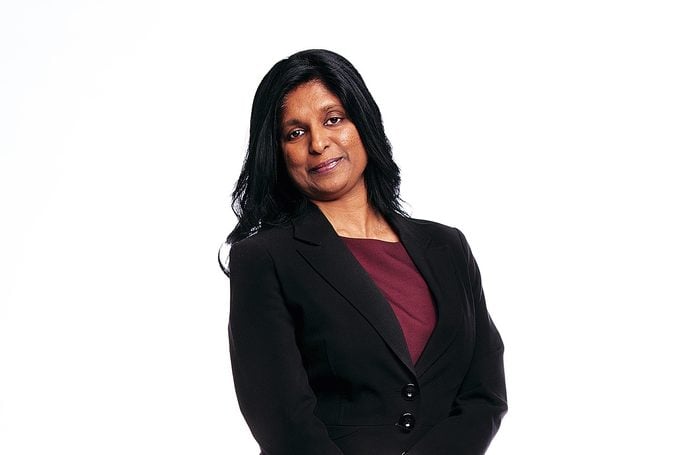Great Canadians: South Asian Autism Awareness
Geetha Moorthy rallies assistance for South Asian families affected by autism.
 Against a twinkling backdrop of pinlights and plush curtains, a cluster of kids and young adults dance to the sunny strains of Pharrell Williams’s “Happy.” Some are assisted in their movements by parents; most look like they never want to leave the stage. They’re here thanks to one woman: Geetha Moorthy, the founder and executive director of Toronto’s South Asian Autism Awareness Centre (SAAAC).
Against a twinkling backdrop of pinlights and plush curtains, a cluster of kids and young adults dance to the sunny strains of Pharrell Williams’s “Happy.” Some are assisted in their movements by parents; most look like they never want to leave the stage. They’re here thanks to one woman: Geetha Moorthy, the founder and executive director of Toronto’s South Asian Autism Awareness Centre (SAAAC).
The performance, part of a fundraising gala held this past March for SAAAC, was a showcase of what the centre works hard to achieve. “In our culture, people with autism are typically hidden away,” Moorthy says. “To be dancing in front of a crowd of 1,000 is an amazing thing.”
Born in Sri Lanka and trained as an accountant and a traditional Indian dancer, Moorthy moved to Canada in 1983 with her husband, settling in Montreal, then Toronto. She found a job in the payroll department at Nestlé and started teaching dance as a hobby. By 1990 she’d taken on 150 students-enough for a production-meets-fundraiser to collect money for children’s charities.
One of those charities, the MukiBaum Accessibility Centre, asked her to lead dance workshops for clients with autism. Dancing improves balance and encourages eye contact, and the intricate hand gestures involved in traditional Indian choreography help develop motor skills. The classes would also facilitate non-verbal communication among participants.
Moorthy noticed that few South Asians attended the workshops. “There’s a stigma within our community; many believe the family of a child with special needs is being punished for a past wrongdoing,” she says. “This leads to denial and a lack of awareness of treatments.”
A solution presented itself in 2008 when a visiting Sri Lankan doctor offered to conduct an information session about autism for South Asian families-if Moorthy helped.
Twelve families showed up to hear basic facts about autism: what it is, its symptoms. It was the first time many of the attendees had partaken in culturally sensitive services.
Word spread. The next session, two months later, had 25 families. Fifty came to the following one. Moorthy soon realized she needed to offer more than information.
In 2010, SAAAC’s inaugural gala raised $25,000. As the group grew, so did its space; its current home, in the suburb of Scarborough, Ont., is a 465-square-metre building that houses programs for 190 families.
At the centre, there are case managers, translators (Tamil, Hindi, Bengali and Urdu), workshops on navigating the medical and education systems, respite care, outreach and therapists-most of it free-for people of all ages. There are also art classes, music lessons and, of course, dancing.
When Shanthi Rajaratnam’s two children were diagnosed with autism in 2003, at ages four and five, the family had difficulty accessing services. Four years later, they moved from Montreal to India to try herbal treatments presented as cures. By 2012, Rajaratnam’s marriage was over and her son, Thambi, had grown violent, attacking both her and his sister.
On the advice of a sibling who had heard of SAAAC, Rajaratnam flew back to Canada. “Geetha came to us right away,” she says. Thambi was placed in a group home, and the family began receiving support at the centre.
Connecting with other parents of austistic children has been a balm for Rajaratnam. “Being able to talk to each other about challenges is such a relief,” she says. Recently, she met up with other adults at a restaurant while their kids were at the centre.
That afternoon, Moorthy’s name came up often. Though she also manages operations and handles financials, the SAAAC founder has remained the first contact for many families. “We all said the same thing: ‘Praise Geetha,'” says Rajaratnam. “Whenever you call, she answers.”



